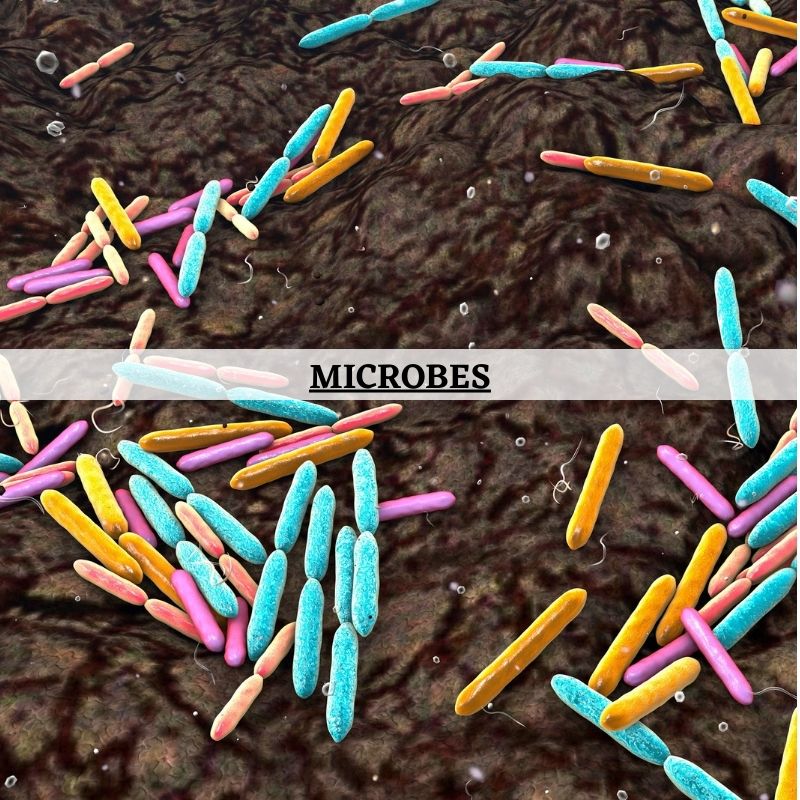 To venture the understatement of the millennia, soil microbes can be our friends. Though infinitesimally small but astronomically abundant (one teaspoon of fertile soil contains more microbes than there are people on earth), microbes are absolutely essential to plant life — and, by extension, to the survival of the human race.
To venture the understatement of the millennia, soil microbes can be our friends. Though infinitesimally small but astronomically abundant (one teaspoon of fertile soil contains more microbes than there are people on earth), microbes are absolutely essential to plant life — and, by extension, to the survival of the human race.
The Function of Microbes
Most terrestrial environments teem with the microscopic single-celled workhorses, which play an indispensable multifaceted role in supporting plant growth. Beneficial bacteria release enzymes, which increase plant uptake of important macronutrients.
Among their incessant duties, microbes provide the following benefits to plants, in either soil or soilless grow media:
- Transform unavailable nutrients into bioavailable forms for plant uptake
- Coat root surfaces to protect plants from pathogens
- Produce hormones and other chemicals to stimulate root formation and shoot development
- Induce the plants’ own disease resistance systems
- Filter out soil contaminants, including heavy metals
- Fight against disease-causing organisms
- Mobilize iron, which plays a critical role in plants’ metabolic processes
- Inhibit parasite growth
- Decompose soil pollutants
- Increase soil organic matter
- Enhance drought tolerance
And when they finish their work, microbes release critical nutrients when they die. Soil microbes play a big role in healthy plant growth and obtaining maximum yield.
Adding Microbes to Your Garden
There are several easy ways to add beneficial microbes to your garden or field. The most common is to add compost, which provides carbon, the microorganisms’ primary energy source. Cover crops provide food for the soil. You can research which crops are the best for your type of soil or ask the horticulture experts at RainMakers Supply.
Keep your soil well watered at moderate temperatures, and avoid physically disturbing the soil through tilling or compacting. Walk in the garden as little as possible. Mulch the beds with leaves or pine needles and avoid using pesticides, herbicides, fungicides and fertilizers that can devastate the microbe colonies. Instead, use organic fertilizer and find the right fertilizer for your crop at RainMakers Supply.
Making Your Own Microbe Mix
It is possible to make your own microbe mix with a little know-how and the desire to get a little dirty. Mother Earth News has published a recipe for a homemade soil microbe mix to enhance your garden or crop field. To make your own microbe mix you will need the following ingredients and tools:
- 2-1/2 ounces unsulphured molasses
- 2 cups of filtered or distilled water, hot-to-the-touch
- 3/4 gallon cool, non-chlorinated water
- 1-gallon jug, cleaned with hot soap and water and thoroughly rinsed
- 2 cups of water, hot-to-the-touch
- 1 cup of dirt from an undisturbed pasture, bottom land, or prairie, harvested every 6 inches from a 3-foot-deep hole dug (using a post-hole digger is preferred) when the soil temperature reaches at least 60 degrees
Thoroughly blend the soil samples. In the jug, add the hot water and molasses, then fill the jug to half-full with the cool water. Add 1 cup of dirt, shake, then fill the jug with the cool water to 2 inches below the neck. Set the mixture in 90-degree heat for approximately 2 weeks, when the foaming stops and the pH is between 3.5 and 4.0.
Mix one part of the microbe mix to 20 parts water and use as a foliar spray on new and established seed beds.
If this seems like a lot of work, you can ask RainMakers Supply for assistance in realizing the benefits of microbes for plants with an easy to use commercial product that benefits your vegetable or cannabis garden.
Build a Wormery for Additional Soil Nutrients
Earthworm manure, known as “castings,” is rich in nitrogen, phosphorus, potassium, other micronutrients and — you guessed it — garden microbes. RainMakers Supply offers plant nutrients with microbes and worm castings, if you want to generate your own microbe rich soil from worm castings you can build a wormery.
To build a wormery, start with an opaque plastic box, such as a closet organizer. Drill 20-30 holes in the bottom, along with holes on the top and along the sides to allow for the free flow of oxygen. Layer the box with several sheets of newspaper, topped with 3 to 4 inches of moist compost. Add about 300 to 500 earthworms, such as red wigglers, and consistently feed them with vegetable scraps and peelings. DO NOT include meat, bones, grease or eggshells.
Monitor the soil’s moisture, adding water whenever there is no condensation on the lid. Keep the box out of direct sunlight. Within several weeks, the worms will generate a healthy sustainable supply of microbe-rich soil. If you want the benefit of microbes from nutrient rich worm castings without caring for your own wormery, ask RainMakers for quality microbe rich soil made from worm castings.
RainMakers Supply Offers Nutrient Rich Microbes for Healthy Plants
Microbes increase nutrient availability, stimulate plant growth, and help to prevent destructive pathogens from harming your plants. Now that you know the many benefits of microbes for plant health, ask RainMakers how to incorporate the best fertilizer for your garden to improve plant growth and maximize yield.
RainMakers Supply is a leading hydroponic growing store in the Chicago area, offering friendly, reliable, expert advice and quality equipment and supplies. We have fresh compost tea packed with beneficial microbrials-$15 for the 1st gallon, $10 for refills. RainMakers helps you to realize the maximum benefit from all your diligent growing efforts. Contact us to learn more about the many benefits of microbes for plants.
